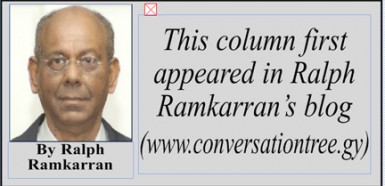The government has been given the choice by APNU to determine whether it wants local government elections or general elections. It could accede to APNU’s demand and fix a date for local government elections. If it does Mr Granger will be forced to claim victory. APNU would not then be able to support the no-confidence motion to lead to national elections.
In the event that the above scenario does not occur and national elections are held as a result of a successful no-confidence motion, the PPP’s campaign strategy, as is already known, would revolve around the alleged refusal of the opposition to cooperate in developing the country. This refusal of the opposition, the PPP will argue, is designed to deny development to Guyana and its people. The examples are well known.
The government will also argue that it has offered full cooperation and the disclosure of all information on all issues of concern including the budget, but that the opposition is unrelenting in its ‘destructive’ conduct. In order to reverse this course and restore Guyana to a path of development, the only option would be to return the PPP/C with an absolute majority. This will be the argument.
 Harping on the same old theme which has been around since 1992 but which has taken on a new urgency because of new circumstances, the PPP will remind the electorate of the PNCR’s past when it rigged elections, destroyed the economy and made Guyana into a pariah state. The reliance on the PNC’s 28-year history in government serves to remind older supporters of the hardships of those days in order to retain their loyalty and to transmit to the younger generation the deprivations of that era in order to encourage them to support the PPP.
Harping on the same old theme which has been around since 1992 but which has taken on a new urgency because of new circumstances, the PPP will remind the electorate of the PNCR’s past when it rigged elections, destroyed the economy and made Guyana into a pariah state. The reliance on the PNC’s 28-year history in government serves to remind older supporters of the hardships of those days in order to retain their loyalty and to transmit to the younger generation the deprivations of that era in order to encourage them to support the PPP.
In relation to the AFC, which is the main electoral threat to the PPP, the latter will try to convince its supporters and former supporters that the AFC is a partner of APNU and that they are on the same course of non-cooperation and implacable hostility. The PPP will try to suggest that the two opposition parties are power hungry and that their policies are based on hatred of the PPP. The PPP will sell to their supporters the idea that supporting the AFC will restore the PNC to office and the bad days of rigged elections and shortages will return.
The PPP is misreading the mood of the electorate. The Guyanese people are tired of the political stalemate. They are frustrated at the failure of the main political parties to cooperate to get things done. The economy is not performing for them. Inequality is increasing and the conditions for the working people and the poor remain stagnant. Opportunities for young people continue to be limited. Guyanese want to look forward to a better life, not backward to a past life.
A winning agenda for the PPP in these circumstances and a new and innovative message which would grasp the imagination of the public, would be a message of political change – ‘a way forward’ to end the political stalemate and instability which has historically retarded Guyana’s economic, social and political progress. The people of Guyana will react positively to a message from the PPP showing ‘The Way Forward.’
The PPP’s forward-looking programme for the 1992 elections was based on the slogan ‘A Time For Change, A Time To Rebuild.’ After 22 years in office, the programme for the next elections would be based on the slogan ‘More of the Same.’ This would mean the same leaders, the same policies, the same claims to victimhood by the PNC, the Americans and the ‘opposition press’ and the same 28 years.
President Ramotar and the leadership of the PPP know that ethnic voting patterns would ensure the retention of its core support whatever its policies They also know that the PPP is entering a new phase of its history where its electoral majority cannot be sustained because of longevity in office and demographic changes.
President Ramotar holds the pen of history in his hands. He can write that history by bringing to realization the destiny of the PPP. Charted by its early leaders, it was a party founded on the principle of national unity. It later became a dedicated advocate for a political solution based on ‘winner does not take all’ which, if implemented, will transform the nature of our politics and our political system, bring to realization the dream of Cheddi Jagan and alter the course of Guyana’s history. President Ramotar supported these positions of the PPP throughout the 30+ years since they were advanced and constantly repeated.
Proposals for constitutional reform in this election campaign, showing ‘The Way Forward,’ to actualize ‘winner does not take all,’ will inspire and motivate the people of Guyana including the youth. President Ramotar should not support such a programme to make history, but because it is the right thing to do and will, in any event, be forced by inevitable circumstances on a future leader. But if he seizes the time and opportunity now, ripe as they are, by a willing and voluntary act, he will write himself into Guyana’s history as a transformative and visionary leader, occupying a place of honour equal to that of our greatest heroes. He will leave an untarnished legacy that will survive for generations to come.





